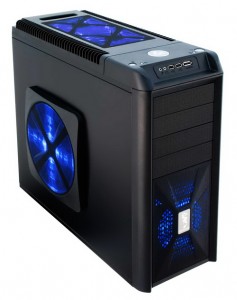How to Build a Computer. Cases Edition!

Computer cases explained and a few examples shown
A computer case is used to house the parts that make a computer work. Usually they are boxy looking and either stand up or lay on its side. A second and arguably more important job for the computer case is guiding the airflow through the computer thus keeping it cool. The case is the single biggest piece of cooling for a computer. And of course the colder a computer is the better it will work. Now there are several unusual cases out there. These are usually created by a community of “case modders” or people who create interesting and unusual cases to house their computers. If you want to see some of those interesting cases just Google computer case mod. For the purposes of this article however I am going to stick to the more standard cases sold commercially since I don’t usually consider cutting torches, band saws and arc welders as standard issue when building a computer.
In the intro, I laid out a few broad categories of computers, and knowing which category of computer you want is key in determining what type of case would be best for your situation. Furthermore, the type of case you get will determine other aspects of your build such as the size of the motherboard and video card you can use since the space is finite.
Gaming computers usually come in one of two flavors; you have your big ass full towers large enough to fit a small child, and your tiny LAN boxes. These are used for LAN parties where you want the power of a desktop computer in a small travel size. The full tower cases allow plenty of room for whatever goodies you want to toss in there and still give you enough room to tinker. A LAN box is barely large enough for a small motherboard, a decent graphics card and a fan, but they weigh next to nothing. Trust me lugging around your 75+ pound full tower case to a LAN party isn’t fun. Especially when your friends just watch and place bets of how far you will get rather than helping. Both types of cases for gaming machines generally have lots of lights designs and some styling to draw the eye since it will be seen. Personally I have a full tower Cooler Master Stacker 830. It is a monster of a case but well worth it once the tinkering begins.
For a Home theater (HTPC) computer you are going to look for a smaller case with good noise control since hearing a fan buzzing doesn’t make for the best TV watching experience. Noise reduction is key when looking for a home theater computer’s case however having something that also looks like it fits with the rest of your entertainment system should not be overlooked. There are several specialty home theater cases available that should get the job done.
With a server you will look for cooling and space. The server should not be seen so it does not have to look pretty. It does need to be big enough to hold a few hard drives and it needs to have amazing cooling properties. Servers tend to get really hot. Most companies have special rooms for their servers that are kept cold to help combat the heat, but for a single server that isn’t really necessary. Still good cooling is a key component to look for. Generally servers are in full tower cases, but that is all up in the air since all a computer needs to be classified as a server is a server version of an operating system on it. There are dedicated server cases out there that have some tweaks, but all in all it isn’t necessary.
I look at studio computers as "gaming computers lite" version. They need decent cooling but not as excessive as a gaming system. A cool looking case isn’t a bad idea but not necessary. All that is really needed is something with enough space to house your storage media since those files can get pretty crazy and something with noise reduction wouldn’t be a bad idea since that could interfere with audio editing. A good quality mid tower case should be perfect here.
If you are looking to just build a general computer there really aren’t any restrictions to what you can use. Anything will probably suit your needs, and a mid tower case will be more than adequate. Build quality will make installing the components easier, but even then after it's put together you probably won’t need to take it apart again so even that isn’t really a big deal.
Examples
Full tower gaming
http://www.newegg.com/Product/Product.aspx?Item=N82E16811119234
http://www.newegg.com/Product/Product.aspx?Item=N82E16811129100
LAN gaming
http://www.newegg.com/Product/Product.aspx?Item=N82E16811129091
http://www.newegg.com/Product/Product.aspx?Item=N82E16811112300
HTPC
http://www.newegg.com/Product/Product.aspx?Item=N82E16811163174
http://www.newegg.com/Product/Product.aspx?Item=N82E16811112186
Server
http://www.newegg.com/Product/Product.aspx?Item=N82E16811102025
http://www.newegg.com/Product/Product.aspx?Item=N82E16811144206
Studio
http://www.newegg.com/Product/Product.aspx?Item=N82E16811129042
http://www.newegg.com/Product/Product.aspx?Item=N82E16811129021
General
http://www.newegg.com/Product/Product.aspx?Item=N82E16811119196
http://www.newegg.com/Product/Product.aspx?Item=N82E16811119068
A note on my Examples.
I buy all my parts from Newegg.com. They have good customer support and fast shipping but they are not the only place to get your parts. Please shop around and go with what fits you best.
Certified Geek




